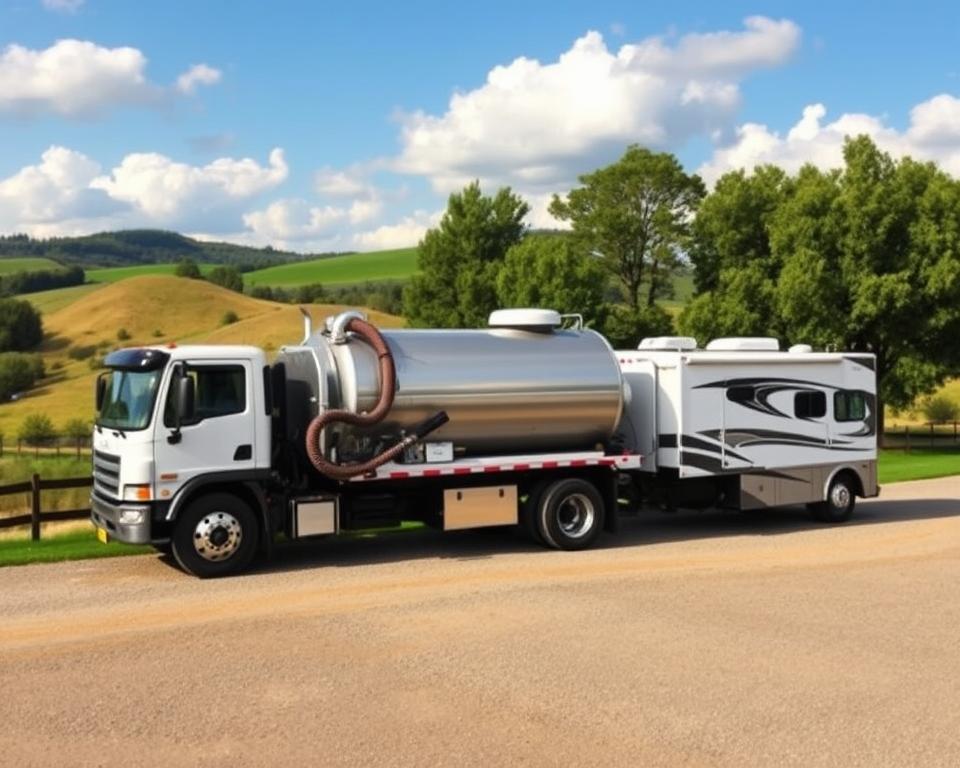RV Black Water Pump: Vital Maintenance Guidelines
Are you sure your motorhome’s black water pump is fit for the journey, or could it spell campsite headaches? Keeping your motorhome’s waste system in prime condition is critical. It wards off unpleasant aromas, blockages, and expensive damage. This guide provides important advice to make sure your sewage pump operates flawlessly, keeping your travels serene.
Comprehending Your RV’s Plumbing System
The RV plumbing system is essential for any hassle-free adventure. It splits into two main parts: the black water system and the gray water system – RV water tank and pump. The black water system captures waste from the toilet, while the gray water system manages wastewater from sinks and showers.
The systems utilize drain lines that feed into different tanks, designed for streamlined waste management. Each tank has a vent to prevent gas from building up, guaranteeing the operation is safe and odor-free. Proper waste management in an RV is critical to forestall leaks or bad odors. By learning about both black and gray water tanks, RV owners can upkeep and manage waste better.
Knowing how your RV’s plumbing works helps spot issues before they worsen. Consistent maintenance ensures smoother travels for everyone. Being proactive with your RV’s plumbing system guarantees reliability during your travels.
RV Tank Categories
Traveling in RVs involves understanding the different tanks. Each one is essential to your RV’s performance, needing regular upkeep.
The fresh water tank stores potable water. It’s critical for a comfortable RV experience.
The gray water tank receives sink, shower, and other non-Septic wastewater. Handling this tank keeps your RV sanitary while traveling. The black water tank, on the other hand, contains toilet waste. It needs routine emptying and careful maintenance to avoid issues.
By recognizing the fresh, gray, and black water tanks, RV owners can optimally control their systems. This planning and ongoing maintenance deliver smooth operation of the waste management system.
Functioning of RV Black Water Tanks
The operation of the black water tank is crucial in RV waste management. It accumulates waste from the toilet via a gravity-fed system. Upon flushing, waste and water are sent into the tank, to be stored until removal is necessary. It’s imperative to keep water levels optimized in the toilet to avoid solid waste buildup.
Knowing how RV waste tanks function can prevent clogs and odors. Without proper care, solid waste hardens, causing blockages and emptying difficulties. Comprehensive tank flushing techniques are critical to preventing these issues, securing smooth functionality.
Regular inspection of tank mechanics is advised for RV owners. This includes watching flushing methods and sustaining adequate water flow. Mastering these essentials supports efficient tank maintenance, heading off expensive fixes later.

Vital Maintenance Tips for Your RV Black Water Pump
Completing regular maintenance on your RV’s black water pump is vital. Kick off by using RV-safe toilet paper to cut down clogs and boost flow. A thorough flush can remove waste and reduce bad smells. Routinely cleaning the tank helps prevent residue buildup, ensuring your RV hygienic and comfortable.
Perform frequent inspections to examine your pump’s condition. Search for any signs of wear or damage that could reduce its function. Using specialized tank treatments, like those from All in Sanitation, can significantly boost both performance and cleanliness. Adhering to these tips can extend your pump’s life and improve your RV’s living conditions.
Opt for RV-Specific Tissue
Maintaining your RV’s black water system necessitates important habits. One essential tip is using RV-safe toilet paper for clog prevention. This specialized product dissolves quickly in water, suited for RV sanitation systems.
RV-safe toilet paper is crucial for tank maintenance. It dissolves fast, avoiding blockages from slow-decomposing materials. This betters waste disposal efficiency and keeps the plumbing smooth.
Choose brands marked as RV-safe when buying toilet paper. These products minimize clog risks and extend your black water tank‘s lifespan by preventing buildup. Regular use ensures a stress-free camping experience, free from plumbing troubles.
Proper Tank Cleansing
Flushing thoroughly your black water tank is essential for proper waste management in your RV. To assist waste movement, ensure the toilet bowl is adequately filled before flushing. Many RVs are equipped with built-in tank flush systems to make the process more efficient. For RVs without this feature, attaching tank rinsers that attach to the sewer outlet offers a reliable alternative.
Correct tank flushing supports waste removal and wards off solid accumulations and bad smells. Keeping up with this process secures your RV stays odorless, making your travels more enjoyable. A dedication to regular and complete tank flushing will enhance hygiene and the overall condition of your RV’s plumbing system.
Stop Residue via Frequent Cleaning
Ensuring your RV’s black water tank free of buildup is vital for its optimal function. Regular cleaning gets rid of lingering waste inside the tank walls. This means flushing well with water and using specific RV tank cleaners for tough deposits.
By cleaning faithfully, you prevent odors and cut down clog risks. A well-maintained tank makes RVing better and helps your plumbing last longer. Incorporate tank maintenance into your routine to ensure smooth travels.
Picking Suitable Additives
Choosing appropriate chemicals for RV black water pump maintenance is vital for managing waste and reducing smells. Many RV enthusiasts favor enzyme-based RV holding tank treatments. These products feature good bacteria to degrade solids and cut down bad odors.
Avoiding harsh chemicals is critical to prevent damage to your plumbing. Such substances can damage pipes, leading to pricey replacements and diminishing your RV enjoyment. Applying safe chemicals for odor control secures your tank and pump’s longevity.
Holding your RV black water tank in top condition betters your travel experience. Using the right holding tank treatment regularly guarantees your system works well.
Regularly Emptying Your Tank
It’s important to empty your RV’s black water tank at the correct moment for efficient waste removal. Make it a goal to empty when the tank is about two-thirds full is prudent. This stops solid waste buildup, providing a smoother emptying process.
Disposing waste at designated stations is vital for safe, eco-friendly waste handling. It’s vital to watch the tank‘s levels closely. Letting it fill completely can create clogs and make disposal more difficult.
Appropriate scheduling and techniques are key for hygienic waste management and can prolong your plumbing’s life. Maintaining steady oversight and doing proper upkeep delivers a pleasant RV living experience.
Inspect and Maintain Seals
Examining seals around the toilet and tank is vital for leak prevention. Over time, these seals might deteriorate, leading to odors and potential harm. A comprehensive inspection will show any wear or damage. Detecting issues early makes possible quick replacement to guarantee a secure connection and odor-free RV.
Holding a bit of water in the toilet bowl helps in preserving seal condition. This protective habit is critical in RV seal upkeep. It prolongs the seals’ life, halting leaks and foul odors.
Consistent seal maintenance can avoid hefty bills later. By prioritizing seal health, RV owners deliver a pleasant journey.
Extra Strategies for Ongoing Upkeep
Booking professional servicing for your RV at least once a year is wise, particularly for black water tank care. This strategy aids in spotting issues sooner and maintains your plumbing system’s integrity.
When preparing your RV for storage, completely clean and empty the black water tank first. Use antifreeze to prevent damage from remaining water during cold seasons. Doing so is critical for protecting the system, guaranteeing it’s ready for your next adventure.
Regular inspections and preventive actions are key to extending your sanitation system’s life. Inspecting connections, hoses, and seals delivers smooth operations. This strategy enhances your RV experience, making it enjoyable all year round.
Guaranteeing your RV’s black water pump is well-maintained is critical for a stress-free camping journey. By sticking to the maintenance tips shared, you can keep your black water system functioning well. It’s key to focus on consistent tidying, applying correct flushing methods, and opting for appropriate chemicals for waste management.
By fulfilling these maintenance requirements, you will eliminate unpleasant odors and blockages. This also prolongs your RV plumbing system’s durability. Proactive care of the RV black water pump results in more time enjoying the outdoors, absent potential setbacks.
Bear in mind, proper upkeep is key next time you gear up for an outing. It’s not the highlight of RV ownership, yet it significantly enhances your travel experience.

